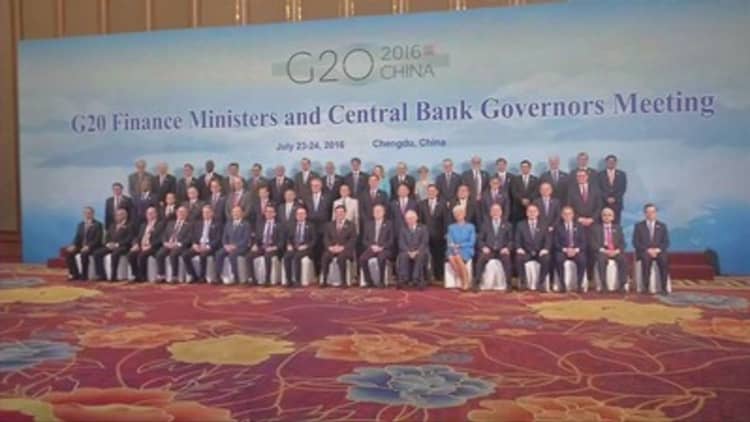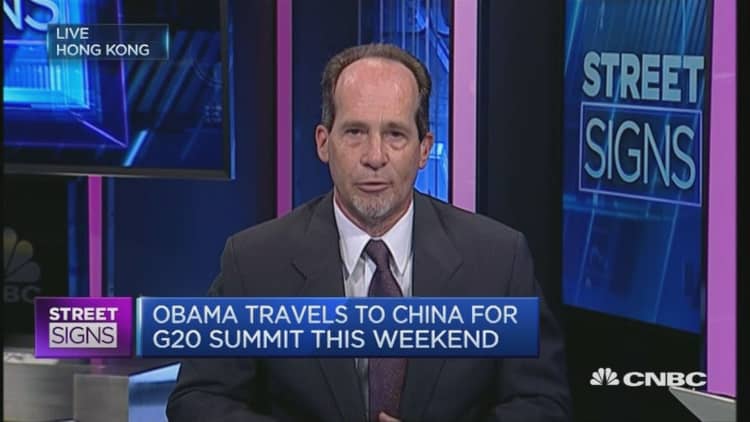
Forty world leaders will descend upon Hangzhou this Sunday for the Group of 20 (G-20) summit to reaffirm their dedication to global growth in a post-Brexit world.
Building an open financial system, promoting the global economic recovery and coordinating monetary policies are among the main topics to be discussed under this year's theme of building an innovative, invigorated, interconnected and inclusive world economy.
Created in 1999, the G-20 is aimed at economic cooperation but expectations for concrete results are low this year.
"Unlike previous meetings of the G-20 which have focused largely on crisis management, the goals of this meeting are less well-defined. The risk is that nothing much will be achieved. Nevertheless, the G-20, despite a lame duck U.S. President, a divided Europe and rampant anti-globalization sentiment worldwide, is more important than ever," remarked Mark Melatos, associate professor at the University of Sydney.
Here are few of the key themes set to dominate talks during the two-day event.
China growth
Beijing is expected to use the summit as an opportunity to convince the international community that all is well inside the world's second-largest economy.
"As a first-time host, China is expected to showcase its growth potential and mitigate concerns on its financial-market risks," Standard Chartered economists stated in a recent note.
Following a rough start to the year, which saw a tumble in mainland stocks, the economy expanded a better-than-expected 6.7 percent on-year in the three months through June, indicating some stabilization.
At the summit, China's leaders will elaborate on proactive fiscal policies and accommodative monetary policies aimed at avoiding an economic hard-landing, lay out a roadmap for supply-side structural reforms, reiterate their determination to maintain a stable currency and outline measures to address rising leverage and non-performing loans, according to Standard Chartered.
Obama's legacy
This year's summit will be the last under President Obama as the end of his second term nears.
That means the head of state will likely use the summit as a platform to celebrate his legacy, Matthew Goodman, senior adviser for Asian economics at the Centre of for Strategic and International Studies (CSIS), said at a Tuesday panel discussion in Washington, according to transcribed remarks. Goodman is a former director for international economics at the White House's National Security Council under the Obama administration.
When the president came into office in 2009, the global economy was crashing and burning so the White House will want to celebrate the progress that's been made, Goodman explained. In particular, Obama's team will want to highlight the fact that the world managed to avoid sliding into 1930s-style protectionism, he added.

Steel overcapacity
A crisis has gripped the global steel industry as excess supply from major producers such as China and Russia floods the market, resulting in depressed prices, factory closures and widespread layoffs.
In a speech to the Brookings Institution on Wednesday, U.S. Treasury Secretary Jack Lew said President Obama would press for action on excess capacity at the G-20, particularly in the steel industry. European leaders are likely to support those calls after the European Union(E.U.) imposed anti-dumping duties on steel products from China and Russia last month.
"I think the word 'steel' is going to be mentioned in the communique of the G-20, which is pretty unusual. This is going to be one of the headlines coming out of this [summit], including possibly establishing some sort of global forum to talk about overcapacity," said Goodman.
Climate change
Environmental concerns have historically taken a back seat at G-20 meetings but that's changed following December's Paris Agreement, which saw more than 190 countries agree to combat the causes and impact of climate change.
G-20 countries not only represent 80 percent of global gross domestic product, but also 80 percent of greenhouse gas emissions, the World Resources Institute (WRI) flagged in an August 15 note.
To show the new importance of climate change, world leaders should put climate and clean energy at the top of the official G-20 communiqué instead of the end, the WRI recommended.
A commitment to phase out fossil fuel subsidies no later than 2025 and incentives for low-carbon investments by pushing comprehensive climate-related financial risk disclosure are other actions that the G-20 should take, the WRI said.
—Follow CNBC International on Twitter and Facebook.

